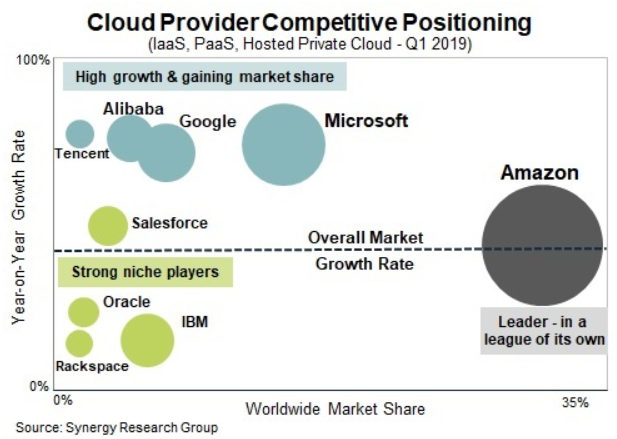Oracle: AWS Used Job Offers to Skew DoD Cloud JEDI ProposalOracle: AWS Used Job Offers to Skew DoD Cloud JEDI Proposal
Oracle and IBM were dropped from consideration for the $10 billion cloud project.
May 9, 2019

Oracle Cloud isn’t about to let a $10 billion Department of Defense contract slip through its hands without a fight.
Both Oracle and IBM have been vocal about what they claim has been an application process written to favor Amazon Web Services (AWS) and Microsoft Azure, even before Oracle and IBM in April were dropped from the list of contenders for failing to meet the proposal’s minimum requirements. The military now is moving ahead with AWS and Azure as finalists for the 10-year Joint Enterprise Defense Infrastructure (JEDI) cloud project and could make a final decision as early as July.
However, Oracle is pursuing its grievances through both the courts and Congress, including through a complaint wit the Court of Federal Claims and through outreach to politicians who have oversight of the DoD and its single-contractor JEDI plans. Most recently, Oracle this week amended its court complaint by claiming that AWS offered jobs at Amazon to two DoD employees involved in the JEDI project.
Oracle claims that one of the people, Deap Ubhi, a former technology work at the DoD, was part of the team that developed the cloud contract after offers of a job and bonuses from AWS. The contract unfairly favored AWS, according to Oracle. The name of the other person offered a job with AWS was redacted in the released version of the amended 125-page complaint that was first filed in December.
The new allegations claim that Ubhi continued working on the contract even after accepting a job with AWS in late 2017 and that when he eventually recused himself from the JEDI project, he created an “elaborate lie” regarding a proposal from AWS to buy a startup called Tablehero. AWS offering jobs to DoD employees tied to the JEDI contract created an “unfair competitive advantage” for the Amazon cloud business, the complaint says.
AWS has not yet responded to a request for comment.
 The allegation regarding AWS’ job offers to the DoD employee is only one of a number of issues Oracle has raised about the military’s JEDI proposal. Other aspects of the contract the software giant is challenging include the DoD’s decision to award the contract to a single cloud provider, which will provide both infrastructure as a service (IaaS) and platform as a service (PaaS) over 10 years, and the decision to exclude Oracle based on “unduly restrictive and arbitrary gate criteria,” according to the complaint.
The allegation regarding AWS’ job offers to the DoD employee is only one of a number of issues Oracle has raised about the military’s JEDI proposal. Other aspects of the contract the software giant is challenging include the DoD’s decision to award the contract to a single cloud provider, which will provide both infrastructure as a service (IaaS) and platform as a service (PaaS) over 10 years, and the decision to exclude Oracle based on “unduly restrictive and arbitrary gate criteria,” according to the complaint.
Winning the JEDI contract project not only will be a financial boon for one cloud provider, but also could open doors to future work from the government and the military, which are pushing cloud projects to save money and improve efficiencies. AWS and Azure are the world’s two largest public cloud providers, according to analysts with Synergy Research Group, which put IBM Cloud and Oracle Cloud in the “strong niche players” category in a recent report. Azure is growing and gaining market share, while AWS is “in a league of its own,” the analysts said.
Along with the legal challenge, Oracle also is trying to put pressure on Congress. In a letter April 25 to the leading members of the House Appropriations Committee, Kenneth Glueck, executive vice president with Oracle, wrote that his company “previously has raised concerns …
… regarding JEDI’s highly circumscribed solicitation requirements, referred to as ‘gating criteria,’ which have significantly and arbitrarily restricted competition for the contract award.”
Glueck noted that the DoD on April 10 excluded both IBM and Oracle from consideration based on the “arbitrary gating criteria,” adding that the military’s “presumed intent behind the gating criteria was to ensure it received bids from large, enterprise-grade cloud service providers … with robust cloud service offerings capable of meeting the unique needs of the DoD. Certainly, IBM and Oracle – two of the world’s largest technology companies – meet these general criteria on its face.”
The Oracle executive asked the Appropriations Committee to use its oversight authority over the JEDI contract to put Oracle and IBM back into the running, saying that “a full and fair consideration of four competing JEDI proposals is in the best interests of the warfighter, the taxpayer and the United States.”
About the Author
You May Also Like


